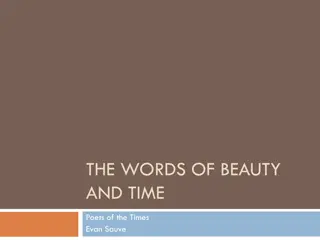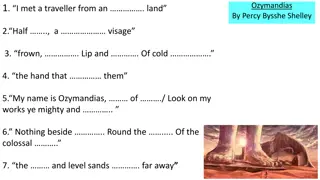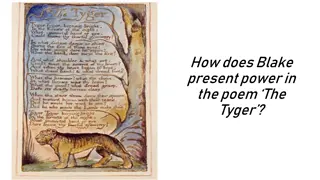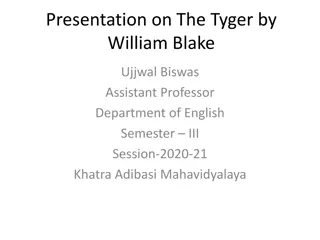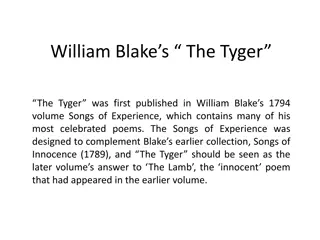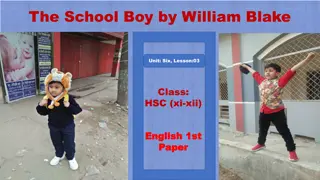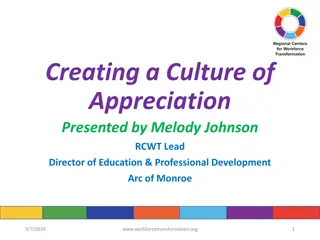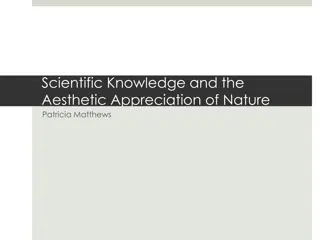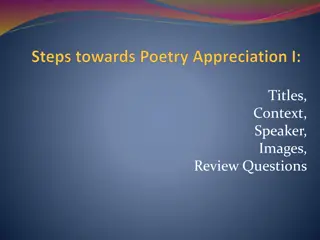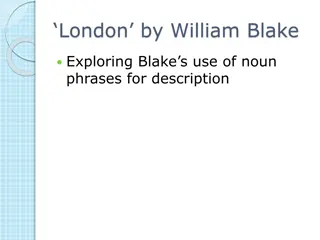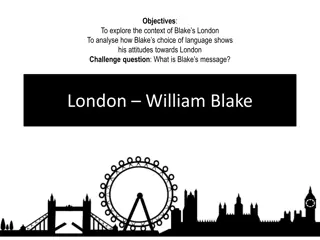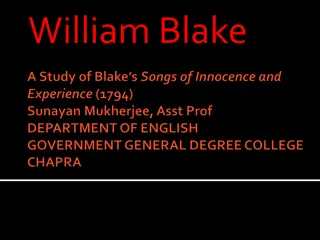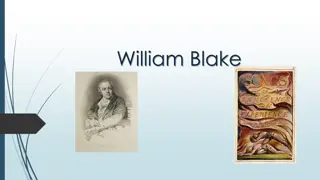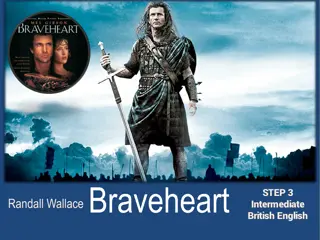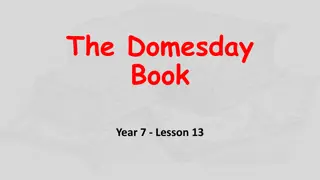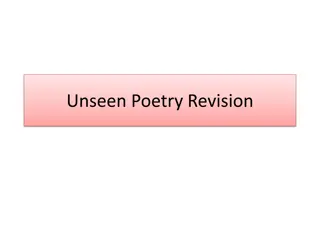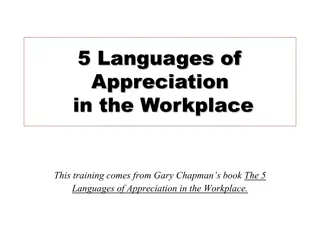Critical Appreciation of William Blake's Poem 'The School Boy' - Lesson 3
Learners will delve into the critical appreciation of William Blake's poem 'The School Boy' in Unit 5, Lesson 3. The lesson entails an elaborate discussion about the poem, offering essential information about the poet, and preparing students for examinations. The poem reflects on the contrast between the joys of nature and the oppressive atmosphere of school, capturing the essence of youthful rebellion and the impact of societal constraints on the individual.
Download Presentation

Please find below an Image/Link to download the presentation.
The content on the website is provided AS IS for your information and personal use only. It may not be sold, licensed, or shared on other websites without obtaining consent from the author.If you encounter any issues during the download, it is possible that the publisher has removed the file from their server.
You are allowed to download the files provided on this website for personal or commercial use, subject to the condition that they are used lawfully. All files are the property of their respective owners.
The content on the website is provided AS IS for your information and personal use only. It may not be sold, licensed, or shared on other websites without obtaining consent from the author.
E N D
Presentation Transcript
Welcome Md. Fazlul Karim Lecturer of English Mansur Hossain Degree College Nandigram,Bogura. 01558-682684/01713-825334
The School Boy Unit-5; Lesson-3
Learners will be able to know Critical Appreciation of the Poem Elaborate discussion about the Poem Essential information about the Poet Examination Preparation
I love to rise in a summer morn, When the birds sing on every tree; The distant huntsman winds his horn, And the skylark sings with me: O what sweet company! But to go to school in a summer morn,- O it drives all joy away! Under a cruel eye outworn, The little ones spend the day In sighing and dismay. Ah then at times I drooping sit, And spend many an anxious hour; Nor in my book can I take delight, Nor sit in learning's bower, Worn through with dreary shower. How can the bird that is born for joy Sit in a cage and sing? How can a child, when fears annoy, But droop his tender wing, And forget his youthful spring! O father and mother if buds are nipped, And blossoms blown away; And if the tender plants are stripped Of their joy in the springing day, By sorrow and care's dismay,- How shall the summer arise in joy, Or the summer fruits appear? Or how shall we gather what griefs destroy, Or bless the mellowing year, When the blasts of winter appear? [3]
About William Blake William Blake was born in London, England in November of 1757. Blake was raised in humble conditions and had a normal childhood except for the fact that he was consistently subjected to visions. When he called to have seen God s head in a window sill at four years old and later the Prophet Ezekiel and a tree full of angels. From a young age Blake was noted for his verse and drawing ability and when he was fourteen he began an apprenticeship to an engraver, the career through which he would eventually earn his living. In 1782, Blake married Catherine Boucher who would become a valuable assistant and loving wife. In 1784, Blake set up his printshop and began to create his famous illuminated etchings. It was through the convergence of his two loves, poetry and art, that Blake published Songs of Innocence in 1789. This work was followed by Songs of Experience in 1794. These works are notable not only for their beautiful illustrations and verse, but for the combination of the two. These piece are generally considered to be Blake s masterpiece. The next years of Blake s life brought new troubles. He was accused of uttering seditious, or treasonous, sentiments against the king, but luckily, was found not guilty. This experience inspired Blake to write the epic poem, Jerusalem. By 1824, his health had taken a downward turn and he died in 1827, in the midst of creating an illustrated version of Dante s Divine Comedy. "The School Boy" is a 1789 poem by William Blake and published as a part of his poetry collection entitled Songs of Experience These poems were later added with Blake's Songs of Innocence to create the entire collection entitled "Songs of Innocence and of Experience Shewing the Two Contrary States of the Human Soul." This collection included poems such as "The Tyger," "The Little Boy Lost," "Infant Joy," and "The Shepherd(Blake)." These poems are illustrated with colorful artwork created by Blake first in 1789.The first printing in 1789 consisted of sixteen copies. None of the copies of Songs of Innocence are exactly alike as some of them are incomplete or were colored in posthumously "in imitation of" other copies. "The School Boy" is a poem written in the pastoral tradition that focuses on the downsides of formal learning. It considers how going to school on a summer day "drives all joy away".The boy in this poem is more interested in escaping his classroom than he is with anything his teacher is trying to teach. In lines 16-20, a child in school is compared to a bird in a cage.Meaning something that was born to be free and in nature, is instead trapped inside and made to be obedient.
Synopsis of each verse The first verse describes the delight of waking up to the birds singing and what a marvellous way this is to start the day. The next verse, however, contrasts with verse one by describing how distraught the schoolboy is to be at school, and how the thought of this halts his happiness immediately. Verse three describes school, how when home-schooled you can sit happily and read. At school, there is no freedom; you will learn what you are told to learn, nothing more, nothing less. School cannot delight him. Verse four compares good boy at school to a bird in a cage: his potential is restrained. Verse five shows how people are dismayed at school and how students are stripped of their joy. The final verse describes how school can never be fun, but it is like a cold winter's day blasting through the warm summer. The Schoolboy by William Blake is a told from the perspective of a young boy who is espousing the cause of many children, that school is negatively impacting him. The poem begins with the young narrator speaking on his ideal morning. He wakes and hears the birds and the distant huntsman blowing his horn. The second stanza jumps to the mornings he despairs of in which he is forced to leave his peaceful sanctuary and go to school. The next two stanzas are infused with melodrama and are meant to elicit sympathy with the reader. The boy describes his miserable days at school and how, like a trapped bird that cannot sing, he should not be required to learn in restraints. The speaker turns to plead with his parents. He tells them that if this continues his buds are going to be nipped, his joy ripped from him, and the loss of his childhood will result in an unpreparedness for life. He will not be able to last through the real trials of life, or winters as he describes them. Illustration and form The illustration for this poem predominantly features elements of nature, which is reflected in the poem's content. At the bottom of the print, there are three human figures sitting down examining either the ground or something upon the ground. This indicates an interest in nature and of what it is compiled. Around the border of the print is a weaving of intertwined vines. Within these vines are foliage such as leaves and flowers- nature within nature. There is also a human figure perched near the base of the vines with her arms extended, reaching up into the climbing flora. Further up the vines, there are two human figures sitting in the crook of two separate vines, each one is reading. This could indicate that the farther one travels into nature, the more one will learn. This, based on Blake's emphasis on a "Natural" education. Also among the leaves and fruit of the vines, on the left of the print is a bird about to take flight. "Both victory and liberty [...] are associated with bird wings." Birds can also symbolize knowledge and nature. The presence of the bird, further indicated the freedom and learning that can come from education from nature rather than the formal classroom. Arranged in six stanzas with five lines each, this poem follows a consistently patterned structure. It also contains a rhyme scheme of ABABB.
Critical analysis This poem highlights Blake's affinity for alternative methods of education. Consistently repeated is the draining element of schoolroom education and how it causes students to contribute poor learning and retention for students. Blake instead promotes learning outside the classroom, specifically he believes spontaneous and natural creativity flourishes. Furthermore, this desire to remove oneself from the classroom (a metaphor for society)is in reference to Anthony Ashley Cooper, the 3rd Earl of Shaftesbury's idea of retirement. In this instance, retirement means to remove oneself from society and return to nature in order to rejuvenate the soul and the imagination from the weary doggedness of society. Cooper believed that remaining in society for a long period of time would result in the soul becoming worn down and that nature was the only relief as it helped redevelop the idea of community and benevolence. The analogy of the bird and the boy is also evidence of the recurring theme of nature within this poem. As a poet of Romanticism, Blake puts an emphasis on nature, the subjective self and on emotions. Within this poem, the allusions to nature are everywhere referencing things such as summer, wind, blossoms, rain showers, birds and spring.[3] Blake equates the seasons of the Earth to the seasons of the boy's life. Blake also analogizes the boy with a caged bird unable to sing, to attain its free place in nature, just like the boy. David Almond references "The School Boy" in his novel Skellig to validate his character, Mina's nonformal learning provided to her by her mother and supplemented heavily by Blake's materials. Sahm writes that, "Mina and her mother quote and reference Blake directly, and many of the characters share his interest in education, spirituality, and imagination. But more than merely quoting Blake s words, the characters in Skellig live and exemplify one of his primary ideas: that of contraries.". Namely in Skellig, Almond uses "The Schoolboy" as primary evidence for his character, Mina's non-traditional education. Which ties in with the text of the poem which continually brings up how being in a traditional school setting is draining, and will make a boy "forget his youthful spring."
Analysis of The Schoolboy First Stanza I love to rise in a summer morn, When the birds sing on every tree; The distant huntsman winds his horn, And the skylark sings with me: O what sweet company! In the first stanza of this piece Blake introduces the reader to his main character and speaker. The poem is told from the perspective of a young school age boy who feels trapped in the monotony of the everyday attendance to his studies. He speaks with the conscience of an older man, projecting the emotions and beliefs common to the Romantic poets, of which Blake was one. The young narrator speaks about the things he loves in this first stanza. He loves to rise in a summer morn and hear the birds singing on every tree. Further in the distance he can hear the horn of the huntsman and the song of the skylark who seems to sing only for him. These are the types of company he desires. This is when he is happiest, a sentiment that many a Romantic poet has expressed. Second Stanza But to go to school in a summer morn, O it drives all joy away! Under a cruel eye outworn, The little ones spend the day In sighing and dismay. The second stanza presents the exact opposite things that drive all joy away! When he is forced to rise on a summer morn and go to school, unable to stay in his peaceful environment, he is unhappiest. He bemoans his, and his classmate s, fate; that they are stuck inside, In sighing and dismay. Third Stanza Ah then at times I drooping sit, And spend many an anxious hour; Nor in my book can I take delight, Nor sit in learning s bower, Worn through with the dreary shower. The young speaker continues on, telling the reader more about his miserable days at school. He sits drooping, hunched over in his seat. He takes no pleasure in school work and is anxiously waiting for the end of the day. He cannot even take delight in his book, or sit in learning s bower as it has been all Worn through by rain. It is clear from these lines that the child is not adverse to learning in general, he appreciates reading and understands the joys that can be gained from encompassing oneself within the bower, or sanctuary, of learning. It is only the structure of school he cannot stand.
Analysis of The Schoolboy Fourth Stanza How can the bird that is born for joy Sit in a cage and sing? How can a child, when fears annoy, But droop his tender wing, And forget his youthful spring! In the fourth stanza of The Schoolboy the speaker is questions his reader, demanding an answer to a rhetorical question. He pleads with whoever is listening and asks how a bird that is born for joy, referring to himself or others that think like him, be asked to Sit in a cage and sing? He knows that he was made to learn, read, and write, but he cannot do so in school, a place he considers equal to a cage. He now turns to begging on the behalf of other children. He makes the case for all those trapped indoors. He professes to worry for their wellbeing and the fact that while they are inside, their tender wings drooping, they are forgetting the spring of their youth. These children, just like he is, are missing out on the joys of being a child. Fifth Stanza O father and mother if buds are nipped, And blossoms blown away; And if the tender plants are stripped Of their joy in the springing day, By sorrow and care s dismay, In the fifth quintet of the poem the speaker turns to address his parents as he sees them as the ones that could possibly change his situation. If only he can convince them to see things his way. In this stanza he presents them with the reasons why they should not force him to go to school. He speaks about his own childhood joys as being buds that are being nipped and blossoms that are blowing away. His happiness is delicate like the tender plants and he should not have to be subject to sorrow and care s dismay at his young age. He need not feel so unhappy when he is only a child. Sixth Stanza How shall the summer arise in joy, Or the summer fruits appear? Or how shall we gather what griefs destroy, Or bless the mellowing year, When the blasts of winter appear? If all of the things stated in the fifth stanza happen, if he is indeed stripped of his joy and given sorrow in return, then how can his parents expect the appearance of fruit in the summer. They should, he states, worry that due to their choices he will never be the same. He will be unable to stand the blasts of winter when they appear. While this poem did appear in Songs of Experience, this child has yet to reach an age in which he will truly feel sorrow or despair. His youthful melodramatic appeal will fall on deaf ears.
Themes The nature and vulnerability of innocence Innocence is presented here as freedom from constraint and self-consciousness. The child starts out taking pleasure in an uninhibited life, full of trust in his world, both natural and human. The fragility of this state is clear from images like blossoms' and tender plants .. strip'd'. The child soon experiences the woe' in life and of learning the possibility of failure and betrayal. Snares, confinement Images of confinement abound in the Songs. Blake the revolutionary opposed the coercive strictures of the Establishment' the state, organised religion etc. - which sought to quantify and rule all aspects of human behaviour. Here, education is formalised and restrictive, actually stunting the development of those it claimed to nurture. Prison imagery is seen in the cruel eye' of the overseer and the cage' of the bird. The perception of children Is the child born free and good, as Rousseau believed, or born sinful, as the Calvinist Christians believed? Or is this opposition the result of fallen human beings' inability to recognise that the capacity for good and evil both belong to humanity? Blake's idea that a young child can clearly see God echoes the Romantic sensibility articulated by Wordsworth, that children had an existence in heaven before the commencement of their earthly life. See The world of the Romantics > Making sense of the intangible world > Seventeenth and eighteenth attitudes to childhood, Blake saw the natural child as an image of the creative imagination which is the human being's spiritual core. He was concerned about the way in which social institutions such as the school system and parental authority crushed the capacity for imaginative vision. The child's capacity for happiness and play are expressions of this imagination. Parental care and authority In Blake's work, parents are often perceived as inhibiting and repressing their children. Their own fears and shame are communicated to the next generation through the parental desire to protect' children from their desires. According to Blake, parents misuse care' to repress children, rather than setting the children free by rejoicing in, and safeguarding, their capacity for play and imagination. Here, parents are seen as colluding with a repressive system; it is as though they are entrapped by a way of seeing the world and transmit that entrapment to their offspring by perpetuating the system.
Examination preparation Read the following text and fill in the blanks with suitable word from the box below. There are more words than needed. Make any grammatical change if necessary. A school must have a (a) and learning-friendly (b) . Teachers will be (c) and supportive, and the children will never be (d) . But the bitter reality is that ours have a quite (e) situation. Our schools are like (f) , and it was (g) unacceptable to Rabindranath Tagore. In a poem of William Blake, in which a young boy expresses his (h) with his school, (i) and teachers. He (j) to enjoy summer s days, instead of going to school. Fill in the blanks with appropriate word in each gap The system of education in our (a) of the world does not (b) children much (c) , and classrooms look more like cages where they are pent up for hours. Rabindranath Tagore found it (d) ; so did William Blake, and English poet and painter, (e) favourite subjects (f) children. In his poem The Schoolboy Blake (g) about a young boy who is unhappy with his school where dour-faced teachers give joyless lessons. He would (h) like to be outdoors and enjoy the summer day. He pleads (i) his parents to rescue him from the (j) of school.
Re-arrange the sentences in correct order: i)He was one of the most renowned linguists of Bangladesh. ii) He died in 1969 and we remember him with respect. iii) He was second to none in Bengali Language and Literature. iv) Dr. Mohammad Shahidullah was born in 24 Porgona, West Bengal in 1885. v) He joined Jessore Zilla School in 1910. vi) He passed the entrance and FA exam in 1904 and 1906. vii) He received some awards and contributed much to Bengali Literature. viii) He passed Hons. and M.A. in 1910 and 1912. ix) He joined Dhaka University as a Lecturer of Bengali in 1921. x) He got his Ph.D in 1928. Theme of the The School Boy by William Brake The poem the school boy discuss a boy s repelling imprisonment at his school his company from the animate objects of the summer morning(birds, flowers etc) to the inanimate object of his school is indeed a matter of concern and grief. School life is an ordeal for him. The boys filling of summer festivity is countered by the terrifying eye of the teacher that robs from him all his childhood happiness. School is nothing but a prison that negates the playful activity of childhood. The restriction of an imposed in school forms a hurdle for the natural expression of creativity and forlorn the essence of geniusness.
The End Thank you very much for watching my content It will be highly appreciated if you leave a comment regarding this content.


